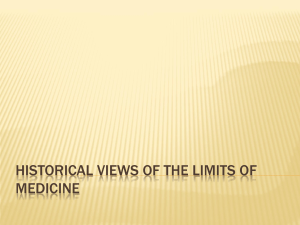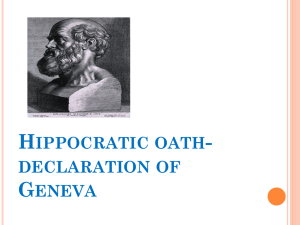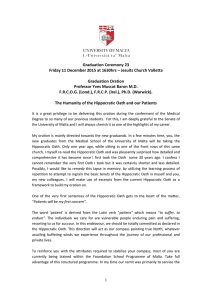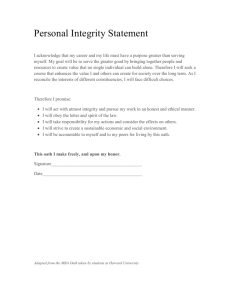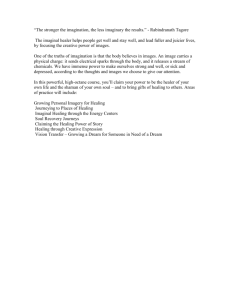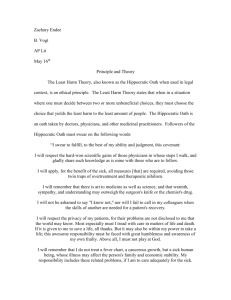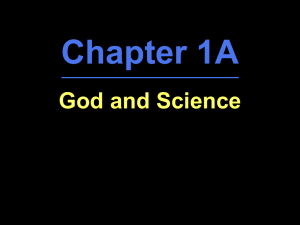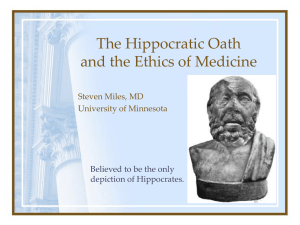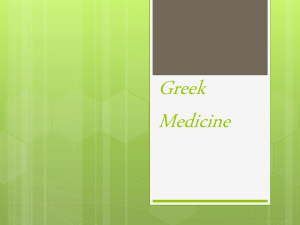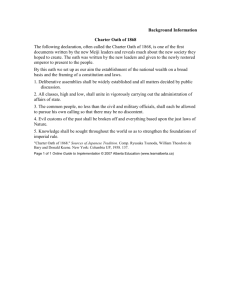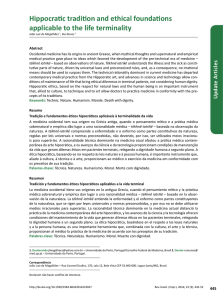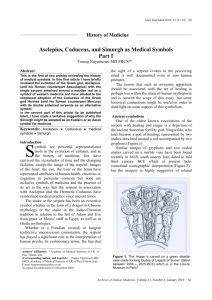Oct 24 Ancient Greek Medicine: Coexisting religious and rational
advertisement
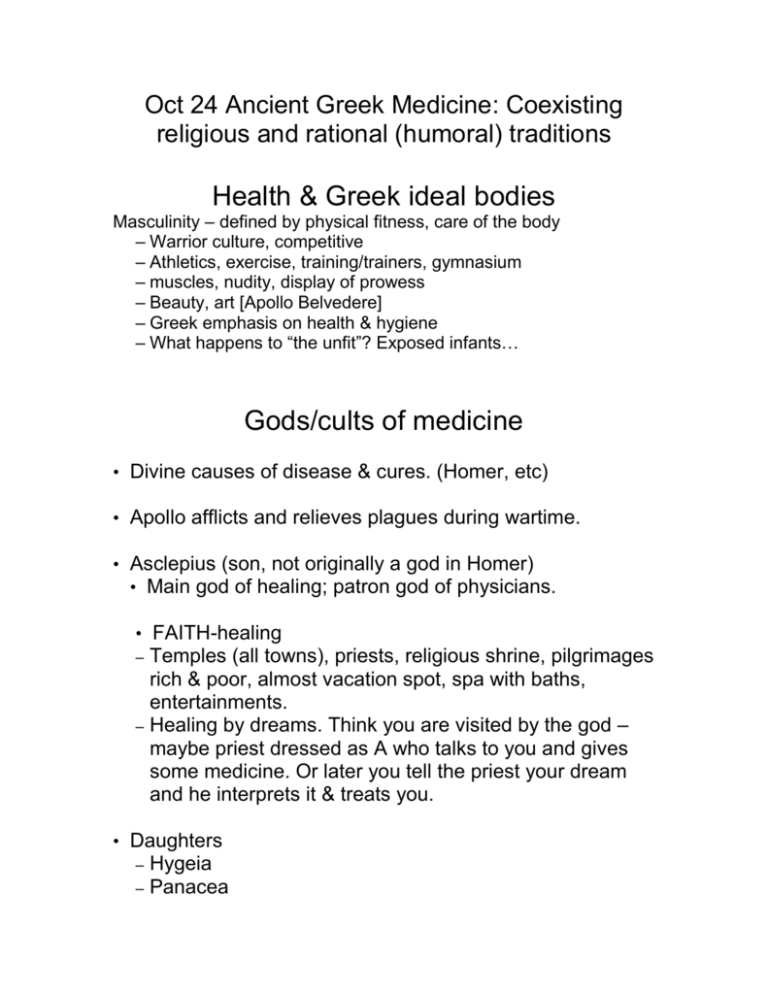
Oct 24 Ancient Greek Medicine: Coexisting religious and rational (humoral) traditions Health & Greek ideal bodies Masculinity – defined by physical fitness, care of the body – Warrior culture, competitive – Athletics, exercise, training/trainers, gymnasium – muscles, nudity, display of prowess – Beauty, art [Apollo Belvedere] – Greek emphasis on health & hygiene – What happens to “the unfit”? Exposed infants… Gods/cults of medicine • Divine causes of disease & cures. (Homer, etc) • Apollo afflicts and relieves plagues during wartime. • Asclepius (son, not originally a god in Homer) • Main god of healing; patron god of physicians. • FAITH-healing Temples (all towns), priests, religious shrine, pilgrimages rich & poor, almost vacation spot, spa with baths, entertainments. – Healing by dreams. Think you are visited by the god – maybe priest dressed as A who talks to you and gives some medicine. Or later you tell the priest your dream and he interprets it & treats you. – • Daughters Hygeia – Panacea – (today’s caduceus vs staff of Asclepius) snake symbolizes rejuvenation, shed skin/illness overlap of mystical & scientific approaches: Empedocles 450BCE Pythagorean priest and healer (?) – medical practice – Claimed miraculous works -- power to cure plague, raise the dead. Followed by crowds demanding “healing words” and drugs. [Pythagorean cult had ethical precepts with medical implications – don’t eat meat or beans.] • Also pioneered rational medicine – study nature of man. – Theory of 4 elements (materialist, random + love/strife). – Body functions due to cooking, cooling when breathe, etc. Start of “men are hotter” concept. His ideas influence humoral theory and physiological theories. The Hippocratic Corpus 430-330BCE • Authors unknown. [compiled at Alexandria 250]—60 texts • Hippocrates of Cos (460-377) – Famous healer and teacher (for fees) All we know from Plato & Aristotle’s few stories about him. Today called “Father of Medicine” and the professional standards (oath/ethics). • Emphasize natural causes and cures. [don’t reject religion] • Links to Presocratic theories of nature [composition of matter/body; how to explain change…] esp Hip book The Nature of Man with 4 humors etc. Example: On the Sacred Disease • Abolish superstitious beliefs about epilepsy – it’s a disease like any other. Quacks claim divine cause & god’s intervention, punishment --use prayers, chants, charms, “secret” magic information, to hide their ignorance. New medicine has the answers. • Hippocratics and Plato theorize that epilepsy is a brain condition, due to excess fluids that block arteries and cause convulsions. What were Hippocratic medical theories & practices? First consider… The Hippocratic Oath …most famous ancient medical document, reputation of Hippocrates as “ideal” doctor… but what about its social context? Hippocratic Oath: what were its functions? (not just rules/ethics/duties for sake of patients—why should doctors follow these standards? Who would?) • • • • • • • • • • I swear by Apollo, by Asclepius, et al. I will honor my teacher in this art. I will treat the sick and abstain from doing harm. I will not give poison when asked to do so. I will not give a woman means to have an abortion. I will keep pure and holy both my life and art. I will not use the knife (surgery). I will abstain from sexual contacts with patients. I will keep silent about any secrets I hear. “If I fulfill this oath, may I PROSPER in my life and art, enjoying a good REPUTATION amongst all men for all time.” The medical marketplace • Competition for patients, $$ [wander town to town for biz] How to establish qualifications and build a reputation and clientele? Justify your unique value? Your business will depend upon your REPUTATION (good pr). ANYONE can hang a shingle and call themselves “healer.” How to set yourself apart. “True doctor” Other types of practitioners (traditional) Priests, sellers of charms, incantations Herbalists, drug sellers Bone-setters, surgeons (wounds) – manual labor Gymnastic trainers Medical education of the day: informal, private (for fees like H), certain cities were known as medical centers. No set curriculum. No degrees offered, no professional licensing. Ways for new groups to set themselves apart from traditional groups and quacks; to look more impressive, more likely successful at curing. Ways for doctors not to appear like greedy money-grubbers – since they are people trying to make a living from work, not aristocracy. What makes them seem more high-class, more professional? • Claim higher ethical standards, selflessness, trustworthy. More than technical expertise—knows when to do nada. • Skill at diagnosis and prognosis (predict course of illness) looks impressive. [and looks kinda mystical, fortune teller?] Gain confidence of patient when you seem to know all about his symptoms, predisposing factors, etc. And by predicting bad outcome, physician avoids blame (or avoids taking that case). Hippocratic writers are very explicit about these self-serving motives. • Learned practitioners base their practices on natural philosophy – prestigious, TRUTH. Intersections of Greek science and medicine (went hand-in-hand) • Seeking natural explanations – Reasoning about how human body works. – Plato, Aristotle, etc. (Democritus) discuss medical topics. – (Some H writers reject all theories; say knowledge comes from medical practice only; is an art, not science.) • Empirical methods – Carefully observe symptoms, progress of sickness, external influences, lifestyle, etc. Debating possible answers – critical thinking, open discussion, refute & defend ideas. Airs, Waters, Places [Impotence of horse-riding Scythians explained – others think it’s the curse of Aphrodite.] Each disease has a natural cause and nothing happens without a natural cause. …They are afflicted with varicosity of the veins because their feet are always hanging down from their mounts. This is followed by lameness….They treat themselves by their own remedy which is to cut the vein which runs behind each ear. The hemorrhage which follows causes weakness and sleep and some, by not all, awake cured. My own opinion is that such treatment is destructive of the semen owing to the existence of vessels behind the ears, which, if cut, cause impotence. So when they come into the presence of their wives and find themselves impotent…they conclude that they have sinned against the divinity whom they hold responsible for these things. They then accept their unmanliness and dress as women, act as women and join with women in their toil. Core Hippocratic doctrines (all texts not consistent, no single coherent theory) • • Health = balance, proper mixture. Sickness = upset, excess/deficiency. • Of bodily fluids = 4 humors. – Blood, phlegm, yellow bile, black bile. • Causes of imbalance may be internal (bad diet, lack of sleep or exercise) or environmental/place (climate, air, water). • Medicine = restore INDIVIDUAL’S correct proportion of humors. [Disease in its form and course is unique to each person. There is no disease “entity” eg infectious agent.] • Treatment by opposites: hot cures cold; dry cures wet. System of opposites in humoral medicine • • • • • Humors Elements Qualities Seasons Temperaments (individuals, nations/races) Why the theory was so appealing and long-lived: simple, flexible, can fit any situation, supported by common experience. Yet entirely speculative. Treatments to restore natural balance of humors • Believe in healing power of nature, so physician should act conservatively. Do what’s most effective, avoid heroics, dramatic methods that won’t work, strong and risky drugs etc. [Body will cure itself if left alone, just keep comfortable.] • • • • Regimen = diet, exercise, rest, sex, etc. Drugs or foods = “take something hot.” (empty theory?) Purging, emetics, suppositories. Bloodletting.
